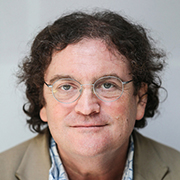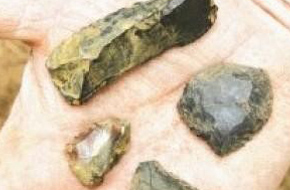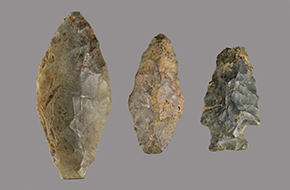Robert Goodby

Robert Goodby is a professor of Anthropology at Franklin Pierce University in Rindge. He holds a Ph.D. in anthropology from Brown University and has spent more than thirty years studying Native American archaeological sites in New England. He is a past president of the New Hampshire Archeological Society, a former Trustee of the Mount Kearsarge Indian Museum in Warner, and served on the New Hampshire Commission on Native American Affairs. In 2010, he directed the excavations of four 12,000-year-old Paleoindian dwellings at the Tenant Swamp site in Keene, and his book A Deep Presence: 13,000 Years of Native American History, was published in 2021 by Peter E. Randall Publisher.
Robert Goodby
Franklin Pierce University
Rindge, NH 03461
goodbyr@franklinpierce.edu
Work Phone: 603-899-4362
Available Program Formats: In person or online presentations
Robert Goodby's Programs

12,000 Years Ago in the Granite State
More than 12,000 years ago, small groups of Paleoindians endured frigid winters on the edge of a small river in what would become Keene, New Hampshire. In 2009, an archaeological survey for the new Keene Middle School discovered the remains of their stay and brought to light one of the oldest Native American sites in New England. The remarkably intact site produced evidence of four separate dwellings containing over 200 stone tools and fragments of burned animal bone. These early people, rather than being isolated stone-age nomads, were part of a social network that extended across much of northeastern North America. The discovery and excavation of the site was required by the National Historic Preservation Act, a frequently maligned piece of legislation that in this instance worked to save an irreplaceable piece of the human story.

Digging Into Native History in New Hampshire
Abenaki history has been reduced to near-invisibility as a result of conquest, a conquering culture that placed little value on the Indian experience, and a strategy of self-preservation that required many Abenaki to go "underground," concealing their true identities for generations to avoid discrimination and persecution. Robert Goodby reveals archaeological evidence that shows their deep presence here, inches below the earth's surface.